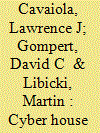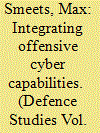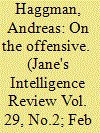| Srl | Item |
| 1 |
ID:
138792


|
|
|
|
|
| Summary/Abstract |
When it comes to cyber war, the United States is ambivalent. While persuaded of the utility of offensive cyber operations, it dreads where they might lead. The advantages of cyber war are swamped by the disadvantages if it cannot be kept under control – and there are nagging doubts about whether it can. That computer systems are often interconnected and ultipurpose,
and that there are no sharp ‘firebreaks’ in cyber war, compounds the dangers of escalation to unintended levels and effects, including the disruption of critical civilian services. In a crisis or war, the United States might, despite misgivings, feel compelled to attack computer systems that enable the enemy to strike US forces, only to find itself engaged in cycles of attack and retaliation that produce more pain than gain.
|
|
|
|
|
|
|
|
|
|
|
|
|
|
|
|
| 2 |
ID:
154923


|
|
|
|
|
| Summary/Abstract |
Hegemonic stability theory holds that a dominant power can produce international cooperation by providing public goods and resolving collective action dilemmas. Successful hegemons also resist the temptation to exploit their advantages in order to reduce other states’ fear of domination. This article asks whether or not the internet needs the United States to play a similar role. If so, Washington should pursue policies designed to strengthen internet security while eschewing espionage and cyberattacks that rely on some degree of internet insecurity. If not, it can go on the offensive without fear of undermining the system as a whole. We examine the technical and political fallout from revealed offensive cyberoperations to assess the relative fragility of the internet. Our findings suggest that it is relatively resilient.
|
|
|
|
|
|
|
|
|
|
|
|
|
|
|
|
| 3 |
ID:
161522


|
|
|
|
|
| Summary/Abstract |
Across the world, states are establishing military cyber commands or similar units to develop offensive cyber capabilities. One of the key dilemmas faced by these states is whether (and how) to integrate their intelligence and military capabilities to develop a meaningful offensive cyber capacity. This topic, however, has received little theoretical treatment. The purpose of this paper is therefore to address the following question: What are the benefits and risks of organizational integration of offensive cyber capabilities (OIOCC)? I argue that organizational integration may lead to three benefits: enhanced interaction efficiency of intelligence and military activities, better(and more diverse) knowledge transfer and reduced mission overlap. Yet, there are also several negative effects attached to OIOCC. It may lead to 'cyber mission creep' and an intensification of the cyber security dilemma. It could also result in arsenal cost ineffectiveness in the long run. Although the benefits of OIOCC are seen to outweighs the risks, failing to grasp the negative effects may lead to unnecessary cycles of provocation, with potentially disastrous consequences.
|
|
|
|
|
|
|
|
|
|
|
|
|
|
|
|
| 4 |
ID:
151780


|
|
|